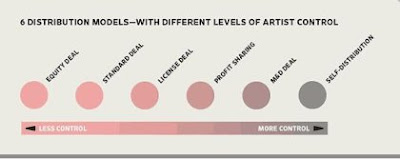Madonna’s now being brought to you by a concert promoter that makes most of its money by getting bums in seats. Every time a Madonna song is copied, it increases the market for her concerts. Talk about a 21st Century business model.
[traditional release means] does us no good, because we don’t cross over [to other fan bases].
Byrne: So this bypasses [the middlemen] and goes straight to the fans.
Yorke: In a way, yeah. And it was a thrill. We mastered it, and two days later it was on the site being, you know, preordered. That was just a really exciting few weeks to have that direct connection.Byrne: … What is music, what does music do for people? What do people get from it? What’s it for? That’s the thing that’s being exchanged. Not all the other stuff. The other stuff is the shopping cart that holds some of it.
Yorke: It’s a delivery service.
Byrne: But people will still pay to have that experience. [link added to Online Fandom] You create a community with music, not just at concerts but by talking about it with your friends. By making a copy and handing it to your friends, you’ve established a relationship. The implication is that they’re now obligated to give you something back.
Mega pop artists will still need that mighty push and marketing effort for a new release that only traditional record companies can provide. For others, what we now call a record label could be replaced by a small company that funnels income and invoices from the various entities and keeps the accounts in order. A consortium of midlevel artists could make this model work. …
I would personally advise artists to hold on to their publishing rights (well, as much of them as they can). Publishing royalties are how you get paid if someone covers, samples, or licenses your song for a movie or commercial. This, for a songwriter, is your pension plan. (emphasis added).
At the end of the day, though, it’s the media companies that will need to readjust their thinking about the industry in order for these initiatives to have a life of their own.


